The first page opened with a poem "March" by Bessie Chandler followed by an article titled "Feasted By the Blind" which was an account of visiting students from the Pennsylvania Institution for the Instruction of the Blind who got a tour of the Indian school and gave an entertainment that featured singing, marching, calisthenics, and musical…
Indian Helper, The (1885-1900)
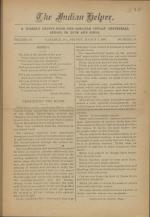
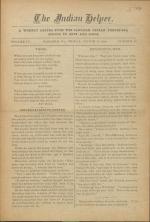
The first page opened with a poem "Think," followed by a story called "Are Indians Kind to Animals? about a Carlisle girl on Outing who threw a blanket over a horse during icy weather. The next piece was about the value of labor titled "Successful Men." Page two began with an article titled "Squeezed Into Shape" that compared processing iron to…
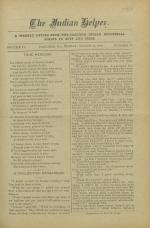
The first page began with a poem titled, “True Heroism,” followed by a fictional conversation among two Indian School students, Tom and Phil as reported by the Man-On-The-Band-Stand. In the moralizing story, continued on the fourth page, Phil sets a good example by keeping the Outing System rules, while Tom broke the rules and tainted the…
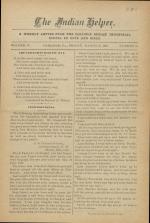
The first page opened with a poem "The Voice That Wins Its Way" contributed by Hannah E. Wilson, followed by a piece called "From John Dixon" which was reprinted from the Albuquerque Indian School where Dixon (Pueblo) was employed as a carpenter and translator for Indian school recruitment. The article continued on page four. Page two offered “…
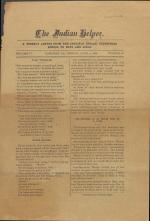
The first page began with a poem titled, “The Tongue,” followed by the Man-on-the-band-stand’s discussion in “Never Before,” that explained that a horde of boys would be marching east toward opportunity but a horde of boys would be marching west toward degradation, which he described as “evil practices and rot.” The page continued with “The…
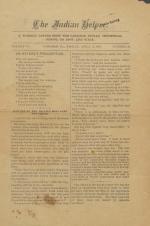
The first page began with a poem titled, “Dr. Nature’s Prescription,” followed by “How One of the Printer Boys Came Out Ahead,” which described how a printer, against the advice of his instructor, was able to repair faulty equipment using his own problem solving technique. This was followed by a short blurb warning against smoking. Page two…
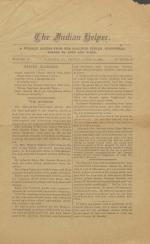
The first page began with a poem titled, “Easter Blossoms,” followed by a notice of “The Wedding” between Guy LeRoy Stevick and Marion Pratt, the daughter of Capt. Pratt. The ceremony was performed by Rev. Dr. Norcross of Second Presbyterian Church followed by a reception for 500 guests in the Indian School gymnasium. Also included on the page…
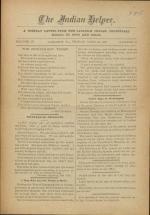
The first page opened with a poem "The Printer-Boy Tramp” by Will Carleton, followed by “Encouraging Prospects” about Luther Kuhns at the Pawnee Agency. Next came “A Man Who was not Afraid to Work” on how General Washington set an example for his corporal. Also on the page was an article titled “Easter Eggs in Washington.” Page two contained a…
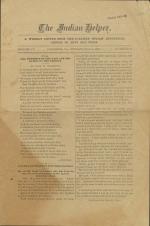
The first page began with a poem titled, “from The Memories of the Past and the Duties of the Present,” by John W. Woodside, followed by a reprint of a letter from former student Clarence Three Stars (Sioux) that reported conditions from his home titled “A Newsy Letter from Pine Ridge Agency: By an old Pupil of Carlisle who has been for Several…
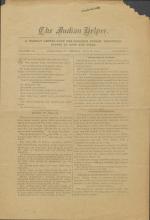
The first page began with an untitled poem with a first line of “God gave us hands – one left one right,” followed by an article describing the seeds of success titled “When It Tells.” The next article was about the Ayan Indians who fish salmon on the Yukon River titled “Sharp-sighted Indians,” followed by a treatise on politeness. Page two…
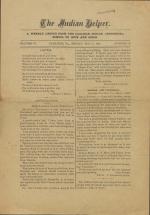
The first page began with a poem titled “Listen,” reprinted from Harper’s Bazaar, followed by the publication of a letter received from Dolly Gould (Nez Perce) on her work at the Ft. Lapwai School under the title “Appreciation.” Felix Iron Eagle Feather’s (Sioux) letter from his Outing home was also included on the page. The second…
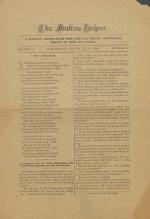
The first page began with a poem titled “My Kingdom,” followed by a story told by the Man-on-the-band-stand called “An Indian Boy in Ohio Whispers His Story of a Hard Row on the River.” The story described how an Indian student survived a dangerous storm in a boat with his companions. Page two opened with a letter “From Peter Powlas, Oneida,”…
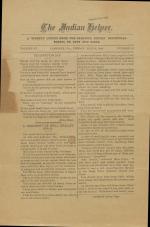
The first page opened with a poem by Helen Hunt titled “Decoration Day,” followed by “A Regiment of Well Drilled Girls,” about the Elisha Kent Kane School in Philadelphia. The report described a fire drill in which 1100 girls as young as three years old, evacuated the school. Page two was filled with articles that included several advice-giving…
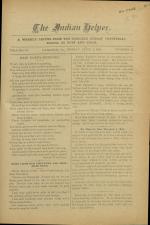
The first page opened with a poem by Susan Coolidge titled “New Every Morning,” followed by a letter from Ernie Black (Cheyenne) titled “News from our Cheyenne and Arapahoe Boys.” Also on the page was a reprint from The Sunday School Times titled “We Must Be Run Through a Mill.” Page two opened with a quote from Paul Boynton (Arapho)…
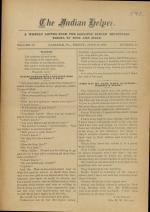
The first page opened with a poem "Wanted,” followed by a fictitious conversation titled “Sallie Lump-of-Mud and Little Miss Sensible Have a Talk.” The page ended with news from Harriet Elder (Nez Perce) and her agency, titled “This Was My Name When at School – Harriet M. Elder.” Page two reported about “The Persian Talk” and an article titled…
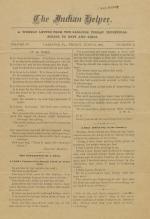
The first page opened with a poem by Fannie Bolton titled “It is Time,” followed by “The Experience of a Bull: A Child’s Version of the Recent Flood at Lewistown,” followed by “A Busy Indian Boy in the Country” which was Wallace Scott’s (Pueblo) description of his farm experience in Bucks County. Page two featured a notice of the new premium…
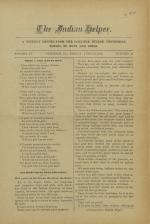
The first page opened with a poem by titled “When a Girl Knows How” to sew, bake and knit followed by “You Home-Going Boys and Girls: Will you be in the New or the Old of the Moon?” which asked J.H. Segar what the Cheyenne and Arapho boys and girls were doing at their agency in Cantonment, Oklahoma. Page two continued the news from Cantonment…
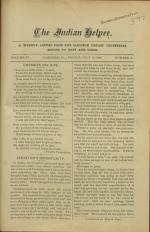
The first page opened with a poem “Cherries Are Ripe,” from Youth’s Companion, followed by a story titled “Sebastian’s Opportunity” about the training of a painter named Sebastian Gomez, a.k.a. “The mulatto of Murillo.” Page two featured a piece called "In Vacation," in which the Man-On-The-Band-Stand invited students to share their…
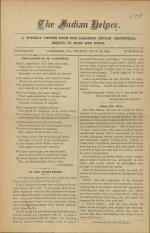
The first page opened with a Longfellow poem "The Ladder of St. Augustine” followed by James Black Hawk’s letter about the Fourth of July at Pine Ridge Agency titled “In the Right Spirit.” Page one also contained “Doing His Duty,” about how a seemingly unrecognized worker was promoted because of his hard work. It continued on page four. Page…
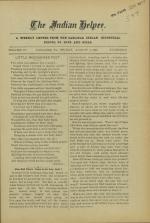
The first page opened with a poem “Little Moccasined Feet,” followed by the article titled “How Did There Come to be Any Coal?” that described the origin of coal. Page two opened with “Small Beginnings,” a litany of how Benjamin Franklin, Columbus, and others had their origins. “How One Conquers,” followed by “Luck and Labor,” as well as…
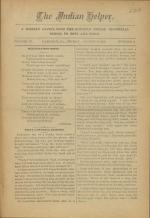
The first page opened with a poem "Willie’s First Boots” followed by “What Lawrence Learned,” about how Right Time and Right Place brought a boy success, reprinted from Wide Awake. Page two opened with a travelogue through California and Arizona to the Grand Canyon titled “Elevation – By Thermometer, and Rail.” Also on the page was a…
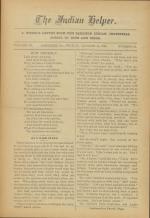
The first page opened with a poem "Our Orderly,” about a seven-year-old Apache boy. The next article, “On A Band Stand,” was about children telling stories on the band stand, which continued on the fourth page. Page two opened with excerpts of letters “From the Out Pupils,” followed by the Saturday evening chapel program that featured Mr.…
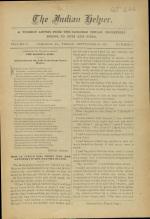
The first page opened with a poem "The Singer’s Alms: An Incident in the Life of the Great Tenor, Mario” by Henry Abbey, followed by the first installment in a series of articles written by the Man-on-the-Band-Stand about a Pueblo girl named Mollie. These stories were later published in book form in Stiya by Marianna Burgess, who…
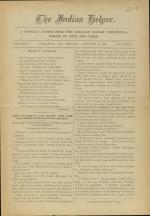
The first page opened with a poem "Bear It in Mind” followed by the third installment of the series titled “How An Indian Girl Might Tell Her Own Story if She Had the Chance: All Founded on Actual Observations of the Man-on-the-band-stand’s Chief Clerk” which continued on the fourth page. Page two offered news from students who were home at…
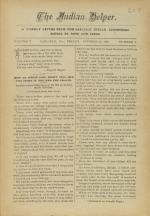
The first page opened with a poem by Bayard Taylor with the first line "Learn to live, and live to learn” followed by the fourth installment of the series titled “How An Indian Girl Might Tell Her Own Story if She Had the Chance: All Founded on Actual Observations of the Man-on-the-band-stand’s Chief Clerk” (continued from the previous week).…
